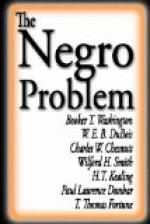BY T. THOMAS FORTUNE
Considering the two hundred and forty-five years of his slavery and the comparatively short time he has enjoyed the opportunities of freedom, his place in American life at the present day is creditable to him and promising for the future.
[Illustration: T. THOMAS FORTUNE.]
There can be no healthy growth in the life of a race or a nation without a self-reliant spirit animating the whole body; if it amounts to optimism, devoid of egotism and vanity, so much the better. This spirit necessarily carries with it intense pride of race, or of nation, as the case may be, and ramifies the whole mass, inspiring and shaping its thought and effort, however humble or exalted these may be,—as it takes “all sorts and conditions of men” to make up a social order, instinct with the ambition and the activity which work for “high thinking and right living,” of which modern evolution in all directions is the most powerful illustration in history. If pride of ancestry can, happily, be added to pride of race and nation, and these are re-enforced by self-reliance, courage and correct moral living, the possible success of such people may be accepted, without equivocation, as a foregone conclusion. I have found all of these requirements so finely blended in the life and character of no people as that of the Japanese, who are just now emerging from “the double night of ages” into the vivifying sunlight of modern progress.
What is the Negro’s place in American life at the present day?
The answer depends entirely upon the point of view. Unfortunately for the Afro-American people, they have no pride of ancestry; in the main, few of them can trace their parentage back four generations; and the “daughter of an hundred earls” of whom there are probably many, is unconscious of her descent, and would profit nothing by it if this were not true. The blood of all the ethnic types that go to make up American citizenship flows in the veins of the Afro-American people, so that of the ten million of them in this country, accounted for by the Federal census, not more than four million are of pure negroid descent, while some four million of them, not accounted for by the Federal census, have escaped into the ranks of the white race, and are re-enforced very largely by such escapements every year. The vitiation of blood has operated irresistibly to weaken that pride of ancestry, which is the foundation-stone of pride of race; so that the Afro-American people have been held together rather by the segregation decreed by law and public opinion than by ties of consanguinity since their manumission and enfranchisement. It is not because they are poor and ignorant and oppressed, as a mass, that there is no such sympathy of thought and unity of effort among them as among Irishmen and Jews the world over, but because the vitiation of blood, beyond the honorable restrictions of law, has




